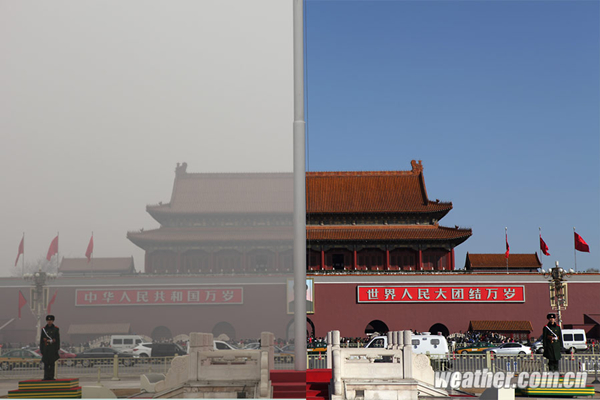Capital hastens effort to cut PM2.5 pollution
China Daily, July 8, 2014 Adjust font size:
The Chinese capital is attempting to speed up the reduction of fine-particulate pollutants, with the aim of reaching the internationally recognized safe level, as it bids to be host for the 2022 Winter Olympics, authorities have said.
|
The Chinese capital is attempting to speed up the reduction of fine-particulate pollutants, with the aim of reaching the internationally recognized safe level, as it bids to be host for the 2022 Winter Olympics. [Photo/weather.com.cn] |
Despite challenges, Beijing will make all efforts to reduce its concentration of PM2.5, which is particulate matter with a diameter of 2.5 microns or smaller, said Pan Tao, head of the Beijing Research Institute of Environmental Protection.
PM2.5 pollutants can penetrate the lungs and are very harmful to health.
Pan said it was estimated that the city's PM2.5 intensity is expected to be reduced to 60 micrograms per cubic meter as of 2017 and 35 micrograms per cubic meter as of 2030, from the current 89.5 micrograms per cubic meter.
The city's ambition to host the 2022 Winter Olympics with Zhangjiakou, a city in neighboring Hebei province, has drawn public attention to the smog issue, a much-debated topic in Beijing during the past several years.
The city's environmental authority said it has recently taken up tougher measures and levied harsher fines against polluting enterprises to reduce the region's notorious smog.
The city's environmental watchdog has imposed a record fine of up to 26.17 million yuan ($4.22 million) in the first half of the year, targeting coal-fired boilers with excessive smoke exhaust and other polluting industries, including cement and steel plants that lack emission-monitoring facilities, the authority said.
The Beijing Environmental Protection Bureau has also conducted a crackdown on outdoor barbecuing and construction sites that leave dumps uncovered, with a penalty of more than 7.5 million yuan.


